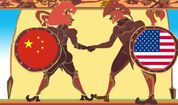Hannah Arendt “On Revolution”. Book review

(Photo: author)
In this book, she aims to track the revolutionary changes which contradict the nature of the European civilization. For example, she is quite skeptical of the idea of democracy and agrees with the Ancient philosophers and with the “Founding Fathers”. Arendt cites Hamilton’s statement presenting his vision of social order: “Nothing, except constant organisation is able to deter recklessness of democracy.” For her and the Founding Fathers, the Constitution is a bulwark of social stability and success. Arendt does recognize that democracy became an ideology in the XX century.
The factor of opinion is disappearing in pure democracy and the voice of minorities immediately becomes erased from the social discourse – only genuine republicanism can provide the best form of social order, according to her. Here, she goes against Karl Marx because she does not accept the thesis in a formula “Interests and Opinions” when the second derives from the first. For a “plurality” of opinion (a human as a single and independent entity) and the basis of effective and successful society, compared to totalitarian societies where collective thinking dominates over the person as an independent cell of social interaction.
Her republicanism is obvious through the constant reference to the English philosopher James Harrington, who developed the idea of republicanism in the XVII century in his famous book “The Commonwealth of Oceana”. Notwithstanding her personal attachment to the ideas of republicanism, she dedicates a significant part of her research to revealing weaknesses and gaps of American constitutional democracy (Chapter 5). Revolution, according to her, is not antagonistic to the ideas of the state, order, or the government because in it, on the contrary, the goal of creating a new state, a new order and a new government is pursued.
The book itself is a mixture of political philosophy and the philosophy of law. It is a really comprehensive piece of research on the phenomenon of revolution. She recognizes that revolution has different directions, and can bring undesirable repercussions.
- The first chapter analyzes the revolution as a philosophical and political phenomenon.
- The second chapter is about the interdependence between revolution and the social question.
- The third chapter is about the role of revolutionary movements; we might even say that the driving force of the revolution is the “strive for happiness.”
- In the fourth and fifth chapters, she skillfully examines the two foundations of revolution, “Constitutio Libertatis” and “Novus Ordo Saeclorum.”
- Chapter six describes the concept of the “revolutionary tradition and the lost heritage”.
Her entire system of views and argumentation on revolution is based upon the intellectual heritage of the Founding Fathers and the historical heritage of the American Revolution itself. In the book, it is possible to see two moral imperatives (which contradict one another): the first was created by the American Revolution and the second was done by the French Revolution. The destinies of these two revolutions have a paramount difference. The first was successful, but history and Europe obliterated this revolution. Instead of it, history and the world nations turned their attention to the revolution that became the progenitress of future revolutions in the XIX and XX centuries. The consequences of the French Revolution are well-known and it is clear how easily it failed in the chaos of “different opinions.” Especially regarding the October Revolution, as she writes:
“What the men of the Russian Revolution had learned from the French Revolution – and this learning constituted almost their entire preparation – was history and not action. They had acquired the skill to play whatever part the great drama of history was going to assign them, and if no other role was available but that of the villain, they were more than willing to accept their part rather than remain outside the play. Terror as an institutional device, consciously employed to accelerate the momentum of the revolution, was unknown prior to the Russian Revolution. No doubt the purges of the Bolshevik party were originally modelled upon, and justified by reference to, the events that had determined the course of the French Revolution; no revolution, so it might have seemed to the men of the October Revolution, was complete without selfpurges in the party that had risen to power.”
The American Revolution, compared with French Revolution, and consequently, with the Russian Revolution was organized by a prosperous society, both in terms of its economy and social cohesion. It is impossible to say this about the next two revolutions. They had been conducted under the motto of “justice and equality to all” – this is already impossible to achieve and moreover, these revolutions were organized by the poor people and socially deprived political and social representation classes. The revolution itself was referring to those people as an institution or as a source of power. A special contrast between American and French revolutions is that they had different feelings regarding the previous “Social Contract”. The American Revolution was not guided by logic that everything from the “old world” must be destroyed – including God, but the French Revolution was guided by the principles of elimination of the remnant of the previous “Social Contract” and that a new one must be concluded. Both the French and Russian revolutions had periods of mass terror. In France, this was undertaken by the Jacobeans’ Reign of Terror and in Russia – the infamous “Red Terror.” For both, the concept of Unitarianism – ideologically and politically – was the basis of their rule. In the United States, neither an era of terror nor the concept of Unitarianism found its place. Furthermore, Arendt pays attention to the fact that the Founding Fathers clearly recognized that it would be dangerous to give full power to the “nation” or the “people.” Decentralization, both at the federal and local level, was for them a very important element, but the Jacobeans and the Bolsheviks opposed this idea.
Interestingly, she refers to Marx and Lenin and their “shock” that history was repeating itself or at least had some sort of patterns. They had witnessed the Paris Commune and reincarnated from the times of French Revolution in 1871 and Lenin faced it in 1905 and even in 1917. They saw that the revolution had created its own “children” (the system of new institutions being completely different from the old regimes and different from the visions of those who organized the revolution). So, they had to decide to destroy the revolutionary institutions or to create their own. The form of communes or “soviets” existed and, as events in the U.S. show, existing without Marxists or Anarchists, it is a deeper phenomenon than we can think. For Arendt, a commune is an alternative form of order and they always go into direct conflict with the professional revolutionaries. They are antagonistic to political parties that consider them as the “costs” of revolution. To some extent, they are the following attempts of creation of “pure democratic” old utopian communities or establishments. Lenin’s example shows, as Hannah Arendt writes, that he lied when he pronounced “All Power to Soviets”, as he just wanted to come to power and to establish party leadership over the country. The “communes” or the “Soviets” are enemies to the Parties, they, as she writes, are “the deadly threat” to parties.
Arendt even mentions the Revolution in Hungary in 1956 as a bright example of the “Soviets” vs the Party. Arendt defends the point that the ideas of Federalism and Republicanism are intrinsic to the Soviets. This point will be crucial in her popularity in liberal and leftist circles. As she says, “those who are elite in the Soviets, furthermore, are the only political elite of the people and from the people, which the contemporary world has ever seen.” For her the “Soviets” are true representatives of the nations and the Party as an institute is the opposite. However, she is against the concept of “equality”, because the talents of humans are the first thing that must be taken into account – “The poet’s talent is determined only by those people who love poetry”.
The ideas of Hannah Arendt can be described as controversial, nevertheless, we can say with utmost certainty that it is impossible to imagine Europe and America without her intellectual heritage.
Autor
Ridvan Bari Urcosta
Senior Analyst at Strategy&Future






Trwa ładowanie...